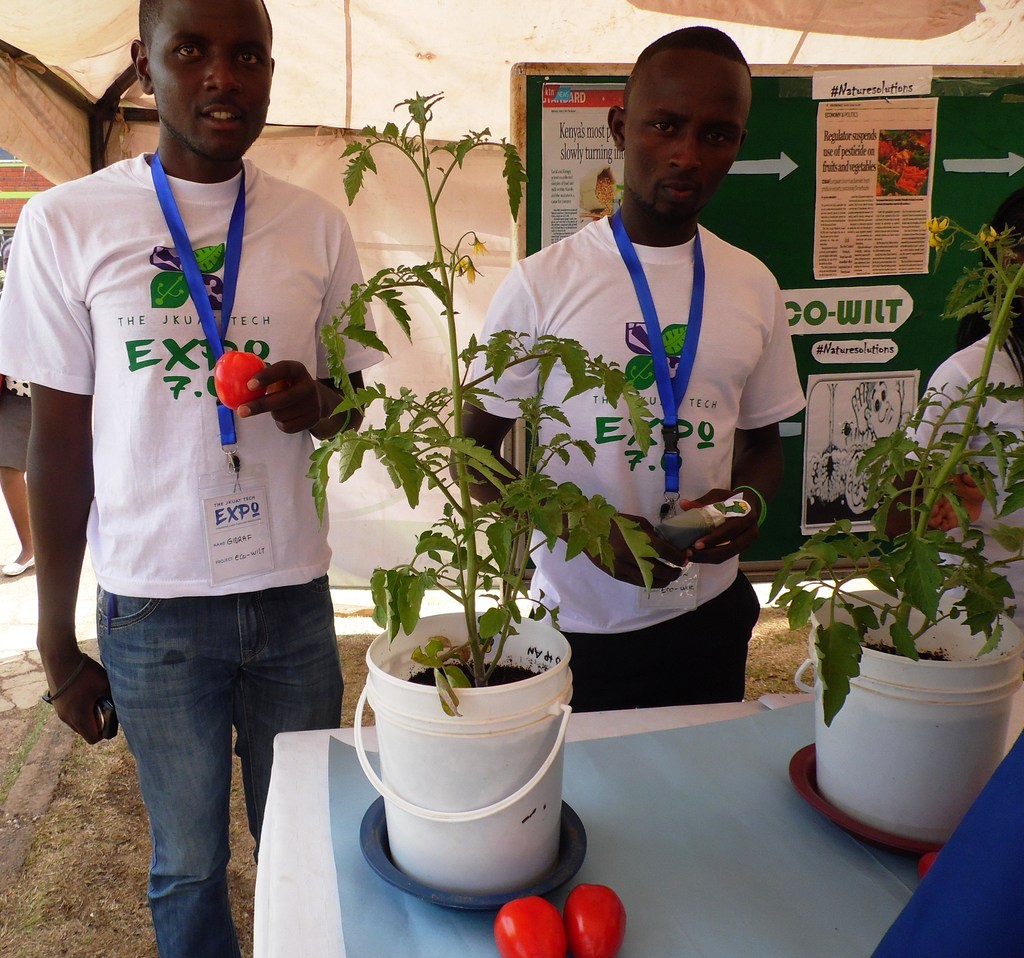Gidraf Mwangi holds a tomato fruit while Clinton Mwangi poses with a bottle of Eco-Wilt solution on November 4, 2016 during a tech expo at JKUAT Main Campus. Four students from JKUAT have come up with the organic solution to deal with bacteria wilt, which does not have chemical remedy. PHOTO BY LABAN ROBERT.
Jomo Kenyatta University of Agriculture and Technology (JKUAT) students have come up with a solution to the bacterial wilt disease that attacks crops in the Solanaceae family.
Eco-Wilt is an organic pesticide that protects roots of tomatoes, pepper, capsicum, potatoes, among other crop against the bacteria wilt microbes.
There is no chemical remedy against the bacteria, which invade and block the roots, therefore, hindering uptake of water and minerals for food synthesis.
Clinton Mwangi, one of the four students who worked on the project, said besides reducing the chemical application in control of pests and diseases, the organic solution eradicates the wilting menace that causes farmers ’total’ losses after an attack.
READ ALSO:New tomato variety battles wilt disease
The students have carried out more than three tests, which have confirmed the effectiveness of Eco-Wilt against the bacteria.
Eco-Wilt is a solution containing a bacterium and a fungus species, which they could not disclose since they are yet to patent discovery. But the two isolated organisms are crop friendly and their presence suppresses the expression o the wilting type.
“The selected bacteria and fungi are drenched into the soil around the root system of crops in polythene bags or containers. The two organisms colonise the area by sticking to the roots, leaving no room for the bacteria wilt to attack,” Mwangi said.
For effective control of the wilt, the soil has to be sterilised first by ‘steaming’ to ensure that the colony of the wilting bacteria is reduced. Eco-Wilt’ fungus also keeps the population of the diseases causing bacteria low by also feeding on them.
READ ALSO: Roasting soil helps deal with bacterial wilt
Steamed soil can be enriched again to restore destroyed organisms ans nutrients.
Mwangi Gidraf, a partner in the project said while the roots feed the Eco-Wilt organisms with absorbed nutrients, they protect the roots against infection in a symbiotic relationship.
Application is by drenching the soil with one mililitre against one litres of water. Application should be done weekly to protect new roots.
The team is moving to large scale tests and registration of the organic pesticide before making it availing it for farmers.
The students, who participated in the JKUAT Innovation Expo 2016, are undertaking degree in the Agriculture Department.
Clinton can be reached on +254714011966 or Gidraf on +254721252864

















Comments powered by CComment